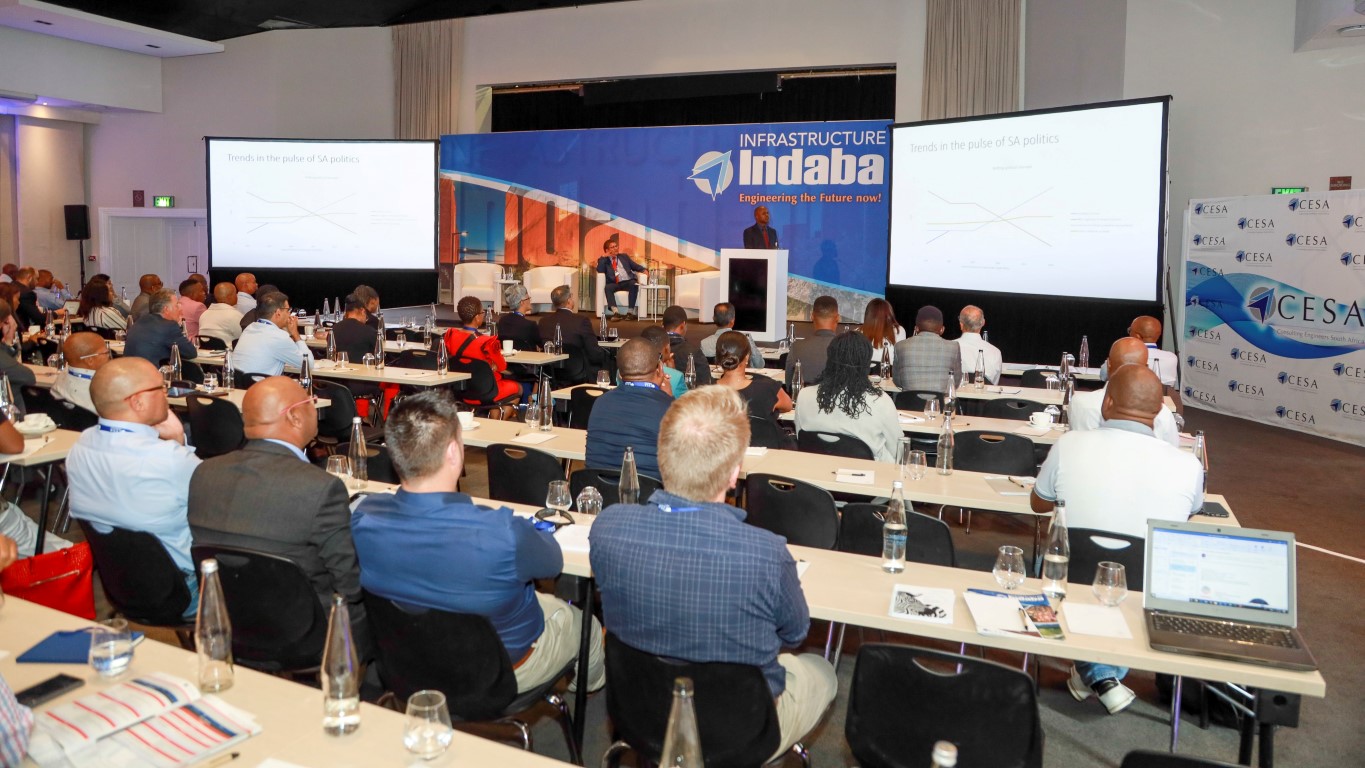13 March 2020 Consulting Engineers South Africa (CESA) hosted its annual Infrastructure Indaba on 11-12 March 2020 at the Spier Conference Centre, Stellenbosch. Wrapping up the successful two-day conference, CESA CEO Chris Campbell had this to say: “This annual event is not just a talk-shop. We pride ourselves in being action-oriented. Over the last two days, I think we can agree that there are some key resolutions we can take forward, which will be a start in solving the problems we are facing as an industry.”
Campbell called on CESA President, Sugen Pillay to present these resolutions and interventions. Prioritised on the agenda is to:
- Encourage, support and increase the utilisation of engineering professionals in all aspects of the construction sector.
- Continue the high-level interaction with government in raising awareness of the value of engineers.
- Assisting the public sector in achieving its objectives in the provision of infrastructure.
CESA has put together a wealth of measurable interventions in this regard, and Pillay encouraged attendees to collaborate and participate in the achievement of these goals.
Pillay said, “We are especially excited about the level of engagement with very senior levels of government. We are seeing a renewed willingness from government to interact with private sector, and a realisation on both sides that we cannot do this alone. As Minister Patricia de Lille said yesterday, ‘If we sink – we sink together’. Hopefully, we will swim.”
Day two of the Indaba started with a focus on gender equality and transformation within the built environment industry. CESA board member Refilwe Lesufi facilitated the discussion. Acknowledging the sensitivity of the topic, she took the delegates through the results of a study done through CESA which took a qualitative approach to assessing the issue in Southern Africa.
The study found that the industry widely acknowledges the value of a gender-diverse workforce. However, most firms do not have a policy regarding gender diversity. Lynne Pretorius from Innovative Transport Solutions further unpacked the finding that only 22% of firms studied have a gender diversity policy or programme. “It is crucial that organisations adorn a ‘set of spectacles’ through which they can drive gender diversity. Policy should be put in place, and leaders must set the culture and tone.” Bringing some practical exercises to the discussion, Corrie van der Wath from Matleng Energy Solutions took the delegates through various activities to help them understand diversity of opinions and perceptions of reality.
Concluding the morning session, Walter Scharf of Gestión Engineering and Project Consultants presented on the future world of business in consulting engineering. “Clients are trying to get consulting engineers to further reduce fees while still demanding high quality.” He said that it is apparent that the current way of work has become a scramble to meet the needs of clients who require an ever-more defined service. “This leads to ineffective designs, corruption and slow service delivery. The consulting engineer of the future should shift from offering ‘cheap and different’ services to taking an entrepreneurial stance which leaves the client with something they can leverage.” He said the key driver must be value creation for the client, consultant and wider business ecosystem. “The consulting engineer of the future looks to benefit multiple stakeholders, not just himself.”
The second half of the day was facilitated by Sahil Patel, CESA Western Cape Branch Chairperson, and looked at infrastructure project opportunities. He called on Ben Peters from the City of Cape Town to discuss short-, medium- and long-term infrastructure project pipelines and spend for the city. “We have found a need to ensure continuity through administration so that the city can continue its projects despite political disruptions,” he began. “A greater focus on planning rather than just execution is also key.” He shared the city’s approach to planning which uses the stage-gate process. This process is used to evaluate new ideas and measure their potential with a structured, data-driven development process. It provides a structured road map that guides projects from idea to completion by dividing a project into smaller phases. At the end of each phase, the work is reviewed at a gate to see whether the project is ready to move to the next phase. “This helps us identify the scope and costs of a project at the beginning and provides a systematic method to control and manage risk,” he said.
Bharat Bhika from Airports Company South Africa presented next and discussed the ten-year development plans for Cape Town International Airport and George Airport. ACSA’s aim is to be the most sought-after partner in the world for airport management solutions. “People mistake us for airlines, but in fact we are landlords, and that means we give serious consideration to our infrastructure development.” The company expects to spend R8.35 million in the next five years to cater for the growing traffic.
The final presentation of the day offered detailed insights into the current political environment, provided by Political Analyst Dr Ralph Mathekga. Presenting a line diagram of the shifting state of political affairs, Dr Mathekga joked that he has finally learnt how to present data to engineers. The diagram showed how, after 1994, the escalation of issues increased to match the rise in intensity of political competition among parties. It also showed the stark decline of ANC’s legitimacy and integrity to govern which has plummeted steadily since 2004. “Fifteen years ago, policy concerns were more amicable but today, issues get escalated because people are suspicious and there is a declining level of trust. That’s because government never asks itself, ‘What will our voters say?’ Citizens are just seeing government getting away with no consequences.”
Dr Mathekga said that a great opportunity for rebuilding centre politics lies in a review of policy development. “In South Africa, it seems policies are drafted targeting ‘victims’. We need to move towards compromise-derived solutions as opposed to giving ultimatums. We need to collaborate and be rational as we justify political choices, and not just move with the majority,” he concluded.

